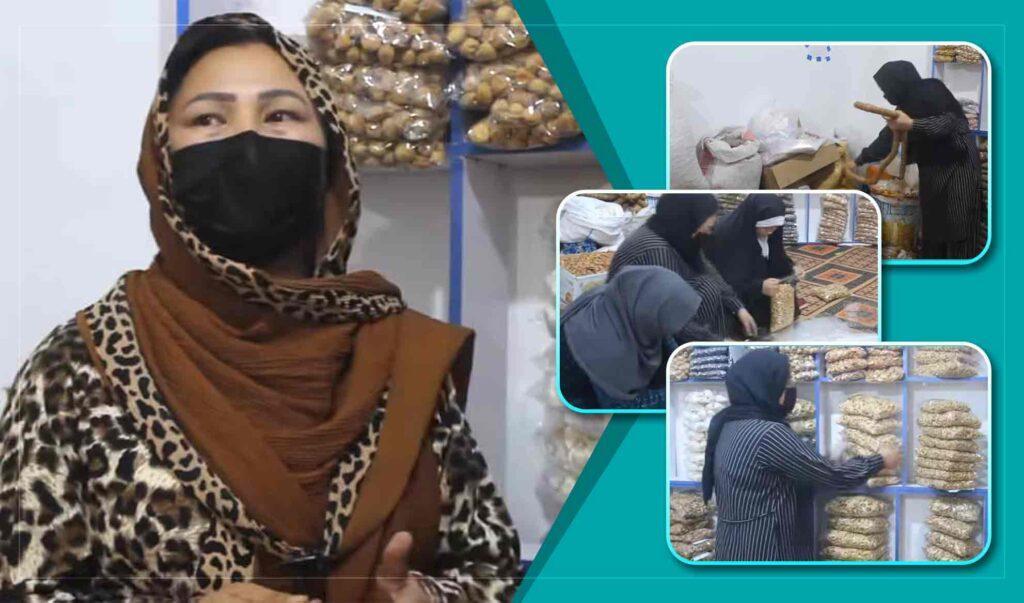
From Hardships To Hope: Daikundi Woman Leads Change
NEILI (Pajhwok): A determined woman is taking bold steps toward economic self-reliance and reaching out to other women to support them in gaining financial independence while women face economic hardships in central Daikundi province.
Life's hardships and the struggle to make ends meet are serious concerns for many women, especially in Daikundi. Yet in Neili city, Marzia Arifi has opened, for the first time, a small dried-fruits processing factory titled“Gul Badam Daikundi Company”, and is working to build a new life with her own hands.
Arifi worked for over 10 years in Daikundi's Education and Justice offices, but loss of income and life challenges pushed her to find a new path-turning unemployment into opportunity.
She says the goal behind launching the factory is to introduce Daikundi's high-quality agricultural and horticultural products to provincial and international markets, while also creating employment opportunities for other women.
She claimed:“In 2021, I worked for 20 days in one of offices. Then a letter declared that women do not have the right to work in NGOs. Again I was confined to stay at home. But I didn't remain idle. I reactivated the Women's Chamber of Commerce and Industry in Daikundi province, and currently serve voluntarily as the provincial focal point. Gradually I decided I should start a company.”
With five other women, she established the factory with an initial investment of 270,000 afghanis.“It has been eight months since we launched this dried-fruit processing factory. Six women work at the company. Each has a defined role-for example one is responsible for procurement, while I coordinate with districts to source dried fruits.”
The factory collects, processes, and packages various dried fruits-especially Daikundi almonds-and every stage of the work is performed by women.
“In Daikundi, business is not well established anymore. Everyone must try with their own ideas and creativity to create an enterprise so that many families can have bread and livelihood, and escape unemployment,” she added.
Arifi explained initially their products were sent to Kabul, Mazar, Herat, and Bamiyan provinces-and they plan to expand exports beyond the country.
She hoped to grow their work further in the future, bringing more women on board. Marzia said that their products are planned to be sent to exhibitions in India and Pakistan.
She is satisfied with her business and that it has become the only source of income for her family. She notes that her future efforts include expanding the business, developing trade abroad, and establishing new production workshops to enable more women to work under one roof.
Her main demands include: establishing trade markets for women entrepreneurs; providing trade visas free or at reduced cost for female businesswomen; introducing women traders to national and international exhibitions; organizing entrepreneurship and vocational-training programs; assisting with business licence fees; and allocating land for women entrepreneurs.
Meanwhile, Department of Industry and Commerce officials explained many women in the province running small businesses are seeing success and meeting their financial needs.
Karim Salehi, Head of Industry and Commerce in Daikundi, told Pajhwok Afghan News currently around 350 women entrepreneurs are officially active in this province.
According to him, in cooperation with the Islamic Relief Organization, 248 women business-owners received financial support last year to help grow their operations.
The department has organized large exhibitions to support and promote products made by women artisans and entrepreneurs in Daikundi, and has introduced 20 female entrepreneurs to trade fairs outside the province, he added.
Salehi emphasized that through coordination with the Ministry of Industry and Commerce and partner organizations, new support mechanisms are being developed for small women-led enterprises.
In recent months, many women in Daikundi have launched various small-scale projects, striving to contribute to their families' living costs and participate actively in the local economy.
hz/ma

Legal Disclaimer:
MENAFN provides the
information “as is” without warranty of any kind. We do not accept
any responsibility or liability for the accuracy, content, images,
videos, licenses, completeness, legality, or reliability of the information
contained in this article. If you have any complaints or copyright
issues related to this article, kindly contact the provider above.
















Comments
No comment